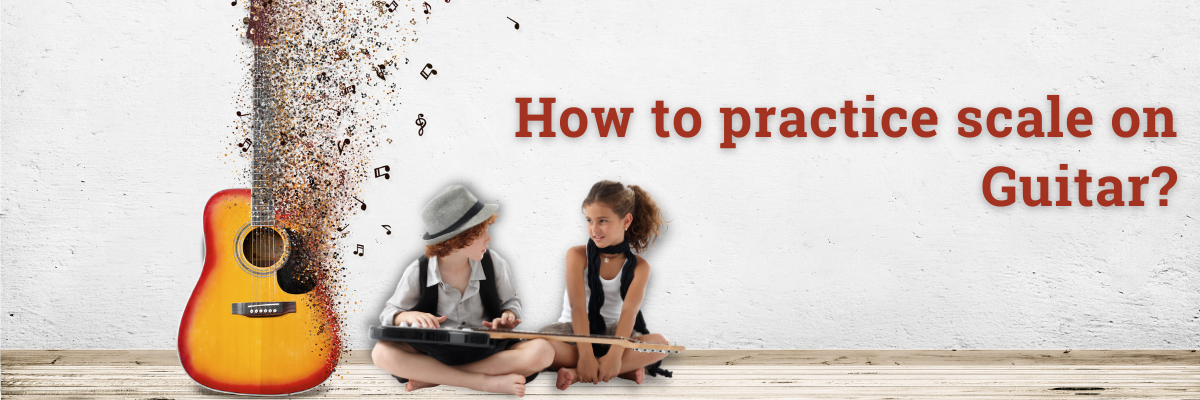
Many guitar players find themselves stuck in a rut, playing the same old scales and licks over and over again. If you're looking for a way to break out of this cycle, practicing scale sequences is a great way to do it! In this article, we'll show you how to practice scale sequences effectively so that you can take your guitar playing to the next level.
What is a Guitar Scale?
A guitar scale is a series of notes played in succession up or down the fretboard. Scales are an essential tool for any guitarist, providing a framework for improvisation, melody and chord construction. There are many different types of scales, each with their own unique sound and purpose. In this blog post, we'll take a look at some of the best ways to practice scales on guitar through online guitar classes or online music classes.
One of the simplest and most effective ways to practice scales is to use a metronome. Start by setting the metronome to a slow tempo and play each note of the scale evenly. As you become more comfortable with the scale, you can gradually increase the tempo. This will help you to develop a good sense of timing and rhythm, as well as improve your finger dexterity.
Another great way to practice scales is to play them in different positions on the fretboard. This means moving your hand up and down the neck as you play the scale, rather than staying in one place. This will help you to learn the scale across the entire fretboard and give you a greater understanding of how the notes relate to one another.
Finally, don't be afraid to experiment with different sounds and textures when practicing scales
Different types of Guitar Scales
There are many different types of guitar scales that you can learn and practice. Each type of scale has its own unique sound and feel, so it's important to find the right one for you. Here are a few of the most popular types of guitar scales:
1. Major Scales: Major scales are the most popular type of guitar scale. They have a bright, cheerful sound and are used in a variety of genres.
2. Minor Scales: Minor scales have a darker, more melancholy sound. They're often used in jazz and blues music.
3. Pentatonic Scales: Pentatonic scales are simple, yet versatile scales that are used in a variety of genres such as rock, country, and folk.
4. Blues Scales: As the name suggests, blues scales are used in blues music. They have a distinctive "bluesy" sound that is perfect for soloing and improvising.
5. Chromatic Scales: Chromatic scales are made up of all 12 notes in the chromatic scale. They're great for developing finger dexterity and can be used in any genre of music.
How to Practice Guitar Scales
When it comes to practicing guitar scales, there are a few different approaches that you can take. It really depends on what works best for you and your playing style. However, there are a few general tips that can help you get the most out of your practice sessions.
One of the best things you can do is to break down the scale into manageable chunks. For example, if you're working on a major scale, break it down into two octaves. Start by practicing one octave of the scale, then move on to the other octave. Once you're comfortable with both octaves, put them together and play the entire scale.
Another helpful tip is to focus on one finger at a time. This will help you to get a feel for the fretboard and learn where all the notes are located. Start by playing each note with your index finger, then move on to your middle finger, ring finger and finally your pinky. Once you're comfortable with one finger, move on to using multiple fingers at once.
Finally, make sure you're using a metronome when practicing scales. This will help you to keep a consistent tempo and ensure that your timing is accurate.
The Benefits of Practicing Guitar Scales
When practicing guitar scales, it is important to focus on the following three areas: technical proficiency, speed and accuracy. Technical proficiency means that you can play the scale correctly and smoothly. Speed means that you can play the scale quickly and accurately. Accuracy means that you can hit the notes of the scale correctly.
The best way to practice scales is to firstly focus on technical proficiency. This means playing the scale slowly and smoothly, making sure that each note is played correctly. Once you have mastered this, you can then begin to increase your speed. The aim is to be able to play the scale quickly and accurately, without sacrificing any of the technical correctness.
Scales are an essential part of a guitar player's repertoire and should be practiced regularly. By focusing on the three areas mentioned above, you will quickly improve your scale playing ability.
Conclusion
The best way to practice scale on guitar is by using a metronome. This will help you keep a consistent tempo and make sure that your fingers are moving in the correct order. You should also start by practicing slow and gradually increase the speed as you get more comfortable with the scale.